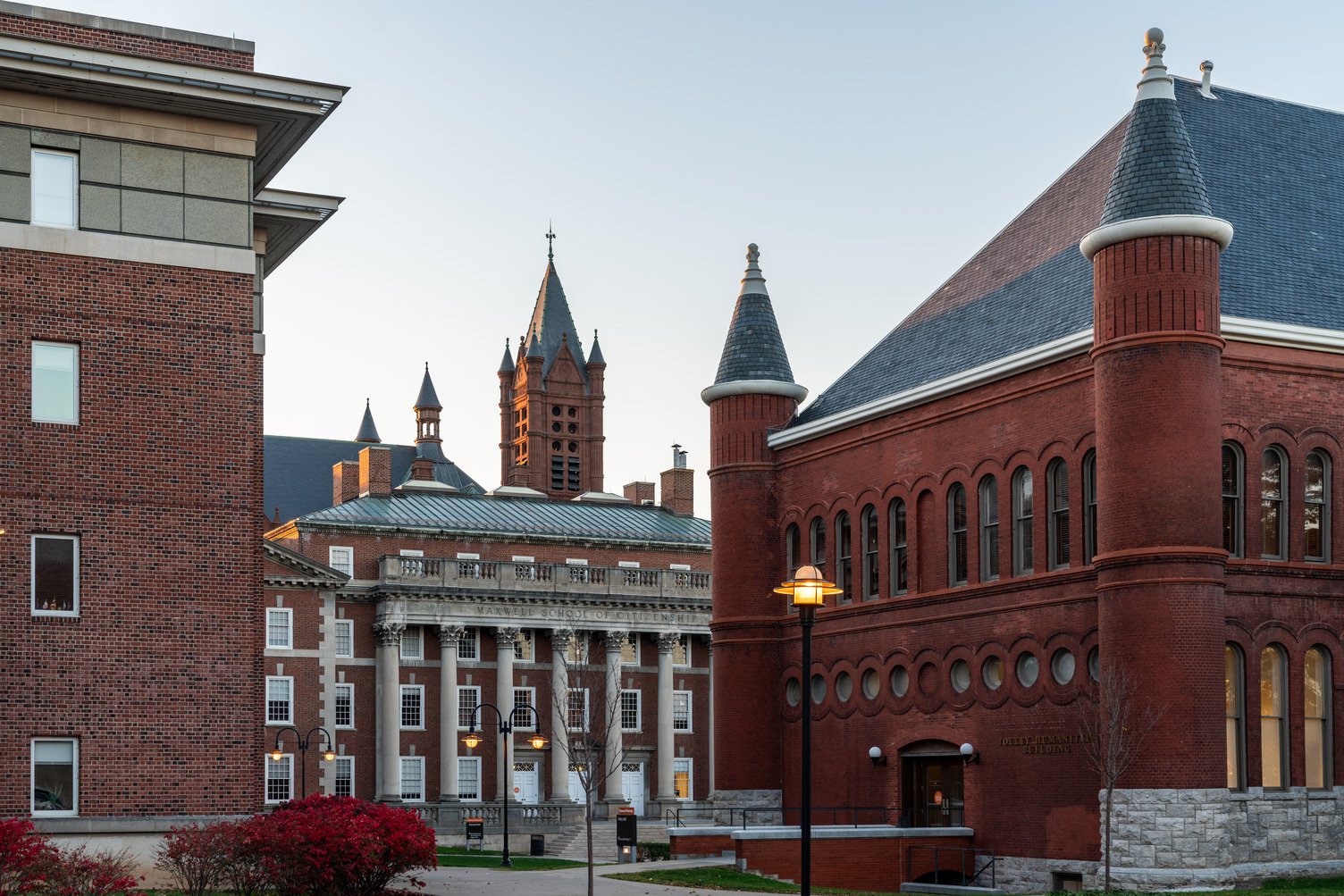Delving Deeper
New interdisciplinary courses challenge perspectives on contemporary topics.

New three-credit interdisciplinary courses on current global issues will be offered to undergraduate students for the 2022-23 academic year by the College of Arts and Sciences (A&S) and the Maxwell School of Citizenship and Public Affairs.
“Part of the value of a liberal arts education is the ability to see the connections between various subjects,” says Lois Agnew, associate dean of curriculum innovation and pedagogy and professor of writing and rhetoric. “The subjects we offer are not meant to be learned in silos but contribute to larger conversations through collaboration, interaction and appreciation of others’ contributions.”
With faculty eager to work together on interdisciplinary questions, A&S Dean Karin Ruhlandt and Maxwell School Dean David M. Van Slyke put out a call for proposals bringing together novel combinations of faculty research, expertise and teaching for students looking to delve deeper into topics that are making headlines.
“Through these new courses, students will be challenged in their critical thinking while examining contemporary issues,” says Ruhlandt. “We are excited to make available even more diversity of learning experiences to undergraduate students.”
“A&S | Maxwell majors already enjoy access to faculty expertise across both schools,” says Van Slyke. “The advantage of team teaching is the ability to explore public affairs through an interdisciplinary lens, adding richness and new dimension to students’ understanding of complex issues.”
While a number of outstanding ideas were proposed, three were selected for the 2022-23 academic year: Muslims in Movies, Music and Media; Science, Religion and Society; and Understanding Challenges to Democratic Citizenship: Lessons from Italian Politics, Cinema and Novels.
Muslims in Movies, Music and Media was created by Associate Professor Amy Kallander in the Department of History, and Associate Professor and Director of Undergraduate Studies Jeanette Jouili in the Department of Religion. Kallander is a scholar of the early modern and modern Middle East with a focus on popular culture in this region of the world, while Jouili is an anthropologist of religion focusing on contemporary Muslim communities in Europe. Together, they have designed a course that introduces students to 20th- and 21st-century Muslim life through movies, television, music and social media—made by and for Muslims. Topics will include how social media platforms help explore questions of identity for young Muslims as they navigate faith, generational differences, activism and even fashion; how the internet and social media have shaped Muslim communities, and ways in which media has been key to Islam’s global reach in transnational social and political movements.
In addition, students will produce individual and collaborative projects that further explore Muslim music and social media through platforms such as TikTok, Instagram and Twitter.
Religion, Science and Society was designed by Mark Brockway, faculty fellow in religion and political science based in those respective departments, and Associate Professor Christopher Junium in the Department of Earth and Environmental Sciences. With research that links religious and political identities, Brockway is especially interested in how secular individuals use science as a moral belief system to overcome partisan divisions. Junium’s research focuses on the long-term evolution of Earth’s surface environments and climate.
Calling religion and science “the most powerful forces in society,” the two faculty members will present perspectives on how these topics both represent different ways of seeing the world while often being inextricably connected in unending conflict. Students will have the opportunity to examine contemporary ideas, such as climate change, stem cell research, public health protocols, and even vaccines, and, at the same time challenge their existing assumptions and engage in new perspectives with a greater understanding of the sociological consequences of science and religion on modern society.
Understanding Challenges to Democratic Citizenship: Lessons from Italian Politics, Cinema and Novels was developed by Associate Professor Margarita Estevez-Abe, Department of Political Science, and Associate Professor Stefano Giannini in the Department of Languages, Literatures and Linguistics. Estevez-Abe’s field of study is comparative political economy of advanced industrial countries, as well as comparative welfare states and gender issues, while Giannini’s current research focuses on the relationship of cultures of the Mediterranean basin, particularly the encounters of modern Italian poets and writers with Northern Africa between the end of the 19th century and the first half of the 20th century.
The course introduces students to key political concepts and theories through the lens of Italy’s past and current events using a multi-disciplinary method that combines readings and films. With the premise that Italy has been “the harbinger of major political disfunctions” that have plagued both Europe and the U.S. for the past two centuries, as well as the first country whose political system was disrupted by social media—a major new political party, the Five Star Movement (Movimento Cinque Stelle, M5S) was created thanks to social media—it is an excellent example of a nation experiencing citizen discontent with politics.
The course will look at many influential Italian films and novels that struggle to make sense of key social events in different but complementary ways. It will also closely examine the role of religion in politics, the rise of fascism, the Mafia and the state, the Cold War and power, immigration and its backlash, and populism. Students will have the opportunity to acquire the cultural competencies of another nation’s history and societal structure, while also being encouraged to look at the U.S. from another country’s viewpoint.
Students interested in registering should consult with their advisor.
Thanks to ongoing academic innovations at A&S | Maxwell, such as these interdisciplinary courses, the reimagining of the liberal arts core and the new Edge certification, students are assured of an undergraduate education that is contemporary, valuable and relevant in a variety of careers or graduate study.
